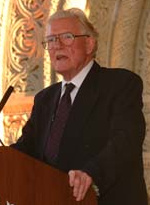
AnthonyFlood.com
Philosophy against Misosophy

Paul Johnson
"The true theological or philosophical point to be made about the Indian Ocean wave if, indeed, there is one is that it is a timely re-minder of the fragility of our existence in this world, the ease with which life on a sunny holiday beach can be snuffed out in a few torrential se-conds, and the awe-some power which na-ture still wields, and will always wield, in a world where science and engineering make such boastful strides in subduing her. And any reminder of the ultimate and total powerlessness of hu-man beings, made always necessary by our arrogance and boasting, must be an act of God, and a very sensible and benevo-lent one too. It can also be argued and this is what our bish-ops, if they had any sense, would be ar-guing that such events make us think about transience and death, and our own preparedness for our extinction and the life to come. So the cala-mity so distressing for those individually in-volved was for hu-manity as a whole a profoundly moral oc-currence, and an act of God performed for our benefit."
Paul Johnson, "Why the giant waves were acts of a benevolent God," The Spectator, January 13, 2005

This was sent as Feedback to The Spectator [UK] on January 15, 2005, but not published.
The Moral Idiocy of Johnson’s Theodicy
Anthony Flood
To assert, as Paul Johnson does, that “the giant waves were acts of a benevolent God” [The Spectator, January 15, 2005] is to use language provocatively, but not wisely. We can get all we want of such talk from the local pub. To answer his question, “What had the deaths of 150,000 Lisboans [and more than that number of South Asians in 2004] to do with a fundamental question like the existence of God?”: it has to do with the moral character of the being whose existence is affirmed, if not also that of the affirmer. Both the recent and more remote catastrophes represent massive instances of excessive, non-disciplinary evil [ENE], evil (a) that no good consequent to it could justify, and (b) so intense that to entertain it in terms of its possible consequent good is itself morally objectionable.
In the case of God, at least as small “o” orthodox Christianity classically conceives him, the power to prevent ENE is infinite and the risk is zero. Refraint under those circumstances is unintelligible given the moral character that is also attributed to God, i.e., boundless loving-kindness. That is, boundless lovingkindness combined with the power to bring about any noncontradictory state of affairs under any circumstances (or none, i.e., ex nihilo) creates a surd so long as there is any evil in the world, but especially so long as there is any ENE. Surds are not intellectually difficult; they are intolerable and to be removed from one’s worldview forthwith.
The “Darwinian Central Committee” that Mr. Johnson holds up to ridicule at least recognizes the problem to which he is embarrassingly insensitive. When, however, he refers to the magnitude of the tsunami’s human toll as “only the tiniest ephemeral blip on the worlds demographic radar,” he could not drive people into the atheistic camp more effectively than if had intended to do so. Each human component of that “blip” had a life that, regardless of what Johnson thought of it, he must have thought worth living. Each of those lives is now lost, and that loss has caused incalculable grief, multiplied by 150,000. And anyone who could have prevented it or any other instance of ENE, but didn’t, is morally challenged. But God is morally perfect. How is that for a problem, Mr. Johnson?
The noble souls who are doing what they can to help the tsunami’s victims are acting according to their sense of moral responsibility: all things being equal, morally responsible people prevent or remedy ENE when they can. The extent of their aid will vary with means, other obligations, and the risk to life, health, or property to which risk their prospective help might expose those goods. For example, a person of normal moral sensibilities spontaneously acts to move a child out of the way of a careening car if he cannot stop the car. He does not sit on his duff, drink in hand, as the tragedy unfolds, muttering, “Well, the driver, the kid, and the kid’s guardian all had free will. That’ll teach arrogant and boastful people how fragile life is.” No, they condemn him under those circumstances, and if given the opportunity, some would be inspired to beat the bearer of that attitude within an inch of his life.
Inability, however, is normally not blame-worthy: no one is responsible for failing to do what he cannot do. So if the God of, for example, Whiteheadian process theology exists, then the microagents (“occasions of experience” was Whitehead’s term) that comprise the cosmos are all open to divine persuasion, but not determined to become as God wills. That philosophical theology provides that (a) there is morally perfect, world-transcending being who is eminently and constantly related to all other agents that comprise the world, (b) all of them are jointly responsible for the world’s having the contingent actuality that it does, but (c) it is not necessary to conceive God’s supreme power as the ability to push gross matter around, e.g., hold tectonic plates steady. God cannot mechanically interact with gross physical objects like those plates, and is therefore not responsible for failing to hold them still, or do any of the countless other things that would result in no evil, or at least no ENE.
Although ENE exists, the choice between (a) affirming the existence of a God of boundless compassion combined with the power to bring about any noncontradictory state of affairs (under any or no circumstances) and (b) denying God's existence is a false alternative. There is a third option: modify one's concept of God.
Modified October 1, 2006